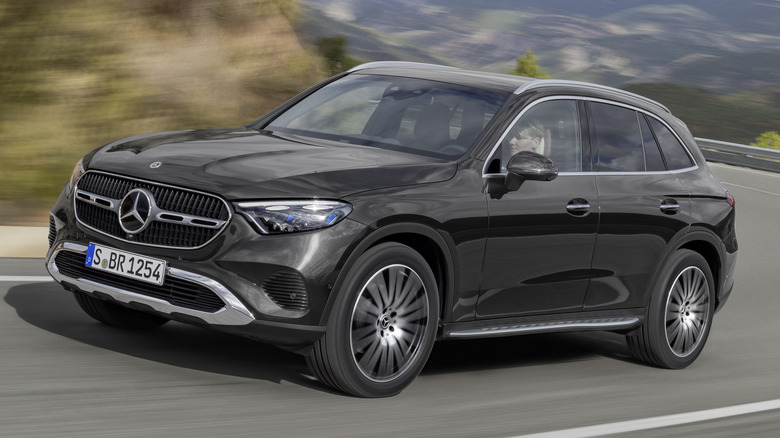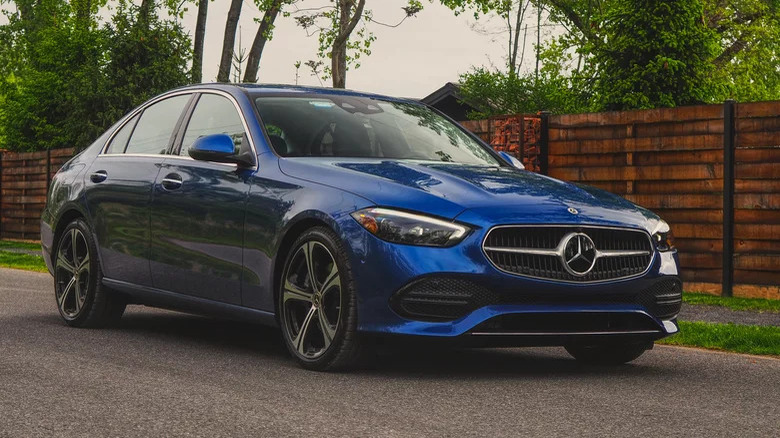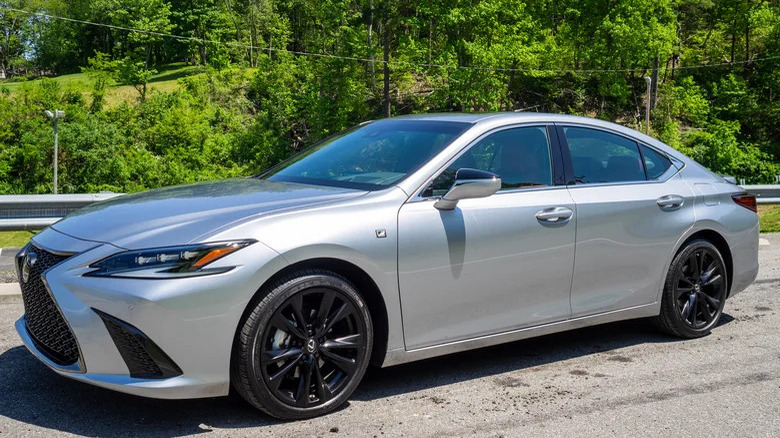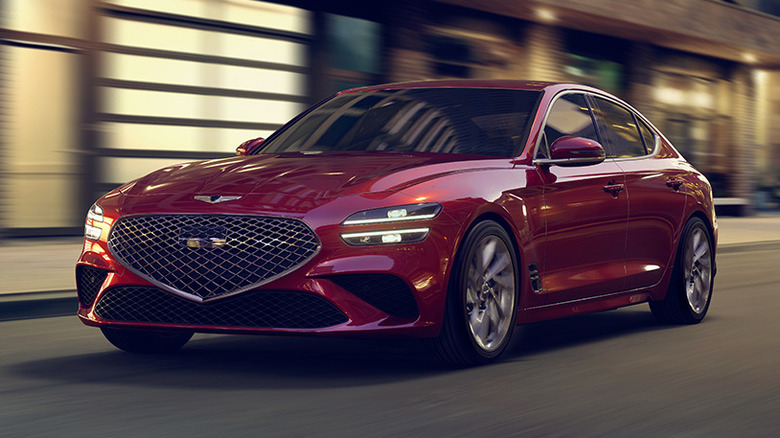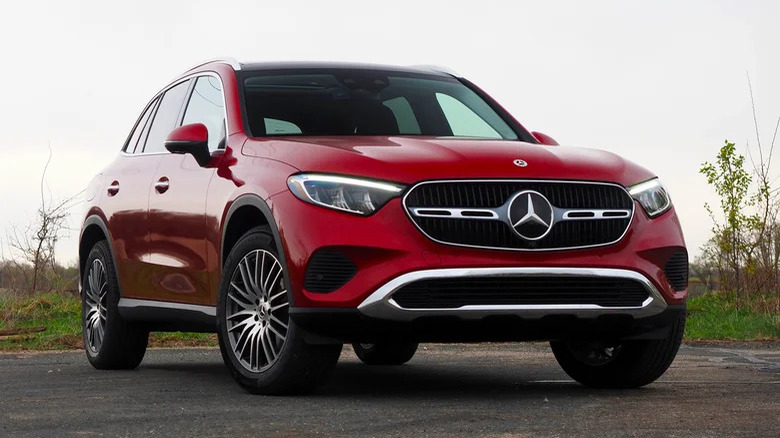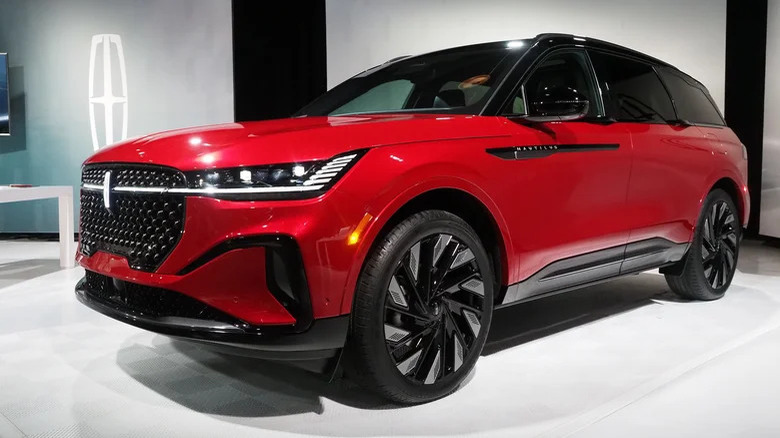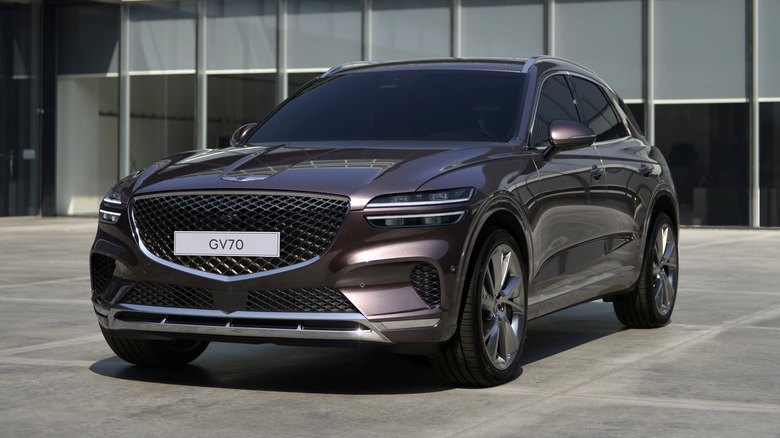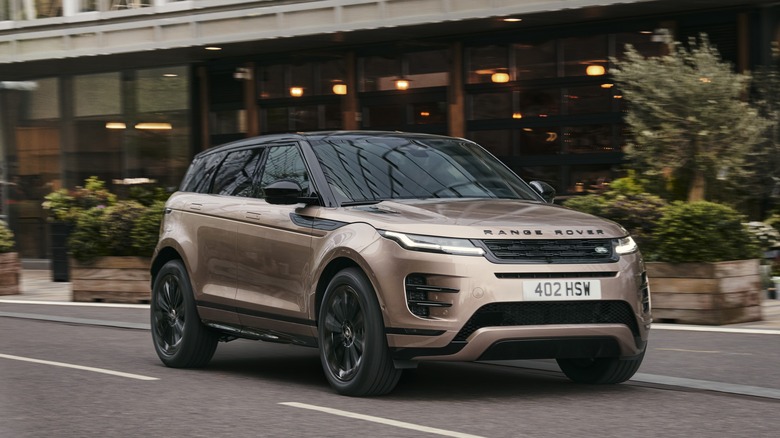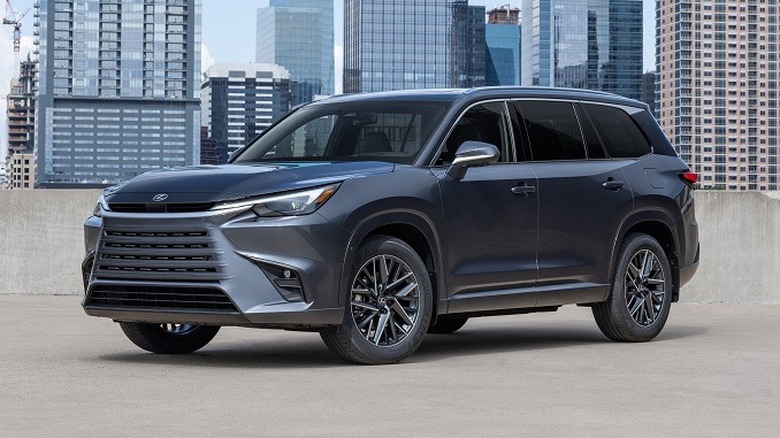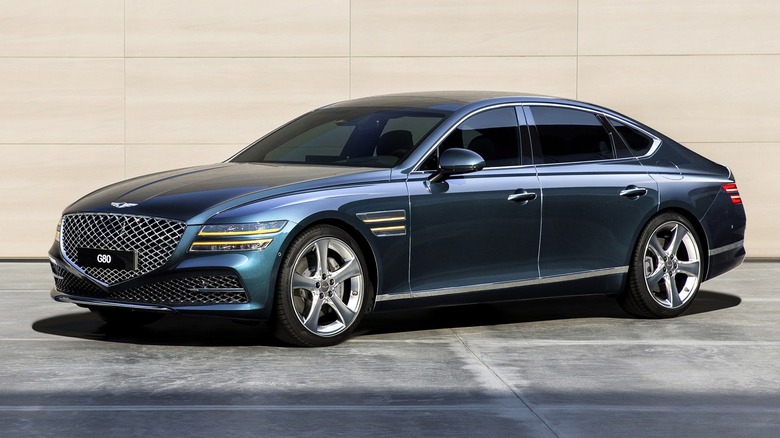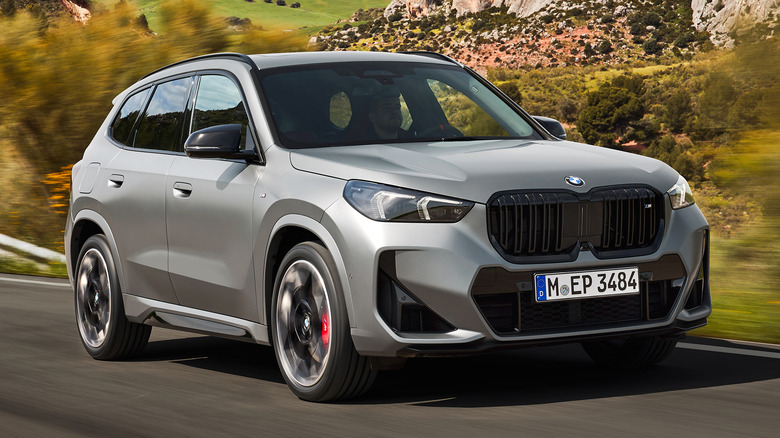10 New Cars That Say 'Luxury' Without Breaking The Bank
It's easy to daydream about being chauffeured around in the latest Mercedes-Benz S-Class or BMW 7 Series, but the unfortunate reality is that many people will never be in a financial position to buy one. However, that doesn't mean that a luxury car is out of reach. In fact, the entry-level luxury sector is arguably better than ever, with a wave of new players fighting for market share against the established guard. The highly competitive nature of the current luxury market means that manufacturers have had to cram more features than ever into their cars to make them stand out, all while keeping prices reasonable.
Recent figures from Kelley Blue Book show that the average price for a new car in July 2023 was $48,334, while the average luxury vehicle cost $63,552. We've rounded up 10 cars that all cost less than the average for their segment, and in some cases, even cost less than the overall average new car. Yet, all of them punch above their weight when it comes to luxury features, competitive tech, and overall value for money.
Mercedes-Benz C-Class
The current generation Mercedes-Benz C-Class debuted for the 2022 model year, and it sports plenty of iterative improvements over its predecessor. Many of those center around the cabin, as the automaker has long cultivated a reputation as having some of the best interiors for the money, and the C-Class more than lives up to expectations here. A slew of upgraded tech is included, with a revised version of the MBUX infotainment system controlled through an 11.9-inch central touchscreen, and a revised AR navigation system.
Although the materials around the cabin are still not quite up to par with those in the brand's high-end cars, they're a cut above most of the competition at the C-Class price point. In fact, our reviewer noted that the cabin itself seemed to take inspiration from the latest S-Class. Considering that the executive limousine is still the benchmark in its segment, being an "S-Lite" is not a bad thing.
Apart from the interior, another similarity between the C-Class and the S-Class is the ride, which prioritizes smoothness and comfort over all-out agility. That makes it one of the best long-distance cruisers in the segment, especially with the optional Driver Assistance Package, which adds lane-keeping and adaptive cruise control. The 2023 C-Class starts at $44,850 for the base-spec Premium trim, while the top-spec Pinnacle trim costs at least $48,800.
Lexus ES
While it's not going to win any prizes for driving dynamics, the Lexus ES is a solid choice for affordable luxury, delivering premium materials and a refined ride at an attainable price. Our test car featured the F Sport Handling pack, although ironically, we didn't think it was particularly sporty or sharp handling. In fact, the opposite proved to be the case, as the ES felt best when gliding along the highway at cruising speed, with the heated and ventilated seats providing comfort and support for longer trips.
The latest version of the luxury sedan bolsters its technology offerings to match, although not better, many of its rivals. Either an 8-inch or 12.3-inch touchscreen controls the infotainment, while Apple CarPlay and Android Auto are baked in as standard. Wireless charging and a limited-time subscription to live service features are also included. Like any Lexus, the fit and finish around the cabin is suitably high-end, even if the interior design itself lacks the chic of some of its rivals. It's far from perfect, then, but the ES still offers a compelling alternative to the German segment leaders it's been battling for years, and with a starting price of $43,190 for 2024, it undercuts plenty of them too.
Genesis G70
Genesis might still be the upstart challenger looking to find its place in the competitive premium car market, but its entry-level sedan proves that it's more than just a flash in the pan. The G70 offers a mix of both upscale features and sporty handling, at a price that should have German carmakers worried. We reviewed the current generation, the Genesis G70 3.3T in 2022, and found its latest improvements to make what was already a good car even better. The new exterior styling brings its design in line with the rest of the Genesis lineup, while inside, a few tweaks have also been made, chief among those being the new 10.25-inch infotainment touchscreen. Higher trims also get leather upholstery, a sunroof, and a 15-speaker audio system.
While the G70 still isn't quite going to match the best that Mercedes-Benz can offer in terms of interior materials, it still feels generally more upscale than its $39,400 starting MSRP would suggest. It's more exciting to drive than many of the other cars here too, being just as adept at conquering backroads as it is at highway cruising.
Mercedes-Benz GLC
Much like the C-Class, the Mercedes-Benz GLC might not be quite as lavish as its upmarket siblings, but it's still more opulent than most of the competition in its price bracket. A new generation debuted for the 2023 model year, bringing with it fresh tech and a revised design. Central to that is a new 11.9-inch central touchscreen, which allows for a cleaner, simpler dash layout than before. The base-spec trim comes with plenty of niceties as standard, including a power liftgate and heated front seats, but there are plenty of packages and optional extras for drivers with extra cash to splash.
The GLC is both smooth to drive on the road and, supposedly, capable off-road too, although we didn't test out the latter during our time with the car. There's even a dedicated off-road mode and a 360-degree view underneath the car available with higher trims, although that seems a little redundant. It's hard to imagine any new GLC buyers hauling their new luxury SUV through the dirt on a regular basis. All this added capability has had an effect on the car's price, which starts at $47,100 for 2023, and can increase significantly if you are happy with the options list.
Lincoln Nautilus
The Lincoln Nautilus is all-new for 2024, and it debuts in a highly competitive segment where just about every luxury manufacturer has a similarly-priced rival. Where Lincoln has tried to differentiate itself from the crowd is in the interior -– specifically, in how it smells. Three different scents are available for drivers to choose from, which can be deployed at any time and paired with ambient lighting for a change in mood. The front seats get optional 24-way adjustable support, to ensure optimal comfort even for the fussiest occupants. This all adds up to an experience designed to be more relaxing than a standard cabin, leaving drivers (in theory at least) more refreshed when they arrive at their destination.
Helping to get them there is the huge 48-inch display, which spans the width of the cabin and displays everything from the gauges to your phone calendar. It's certainly a unique proposition, and it remains to be seen how well buyers will take to the car. However, with a starting price of $50,415, there's certainly a lot on offer for the money.
Genesis GV70
The South Korean automaker's smallest SUV is a big threat to the segment leaders, with the right mix of high-end features, attractive design, and an affordable price tag. Refreshed for the 2022 model year, we thought the GV70 was at its best in mid-range spec, with its 2.5-liter turbocharged four-cylinder providing more than enough grunt while remaining relatively efficient for its segment.
Inside, the car is typical Genesis fare, but that's a good thing, as the fit and finish is more premium than some might expect, and the upholstery feels good to the touch and looks great too. There's plenty of tech as standard, even if it's not quite as cutting-edge as SUVs from the likes of Mercedes-Benz. Its driving dynamics are also competitive with what else is on offer in the segment, but it still remains suitably refined at cruising speeds. Perhaps the biggest selling point, however, is that it's one of the most affordable SUVs of its kind to buy. The vehicle starts at $44,900 for 2024, with even higher trims remaining thousands of dollars less expensive than its biggest rivals.
Land Rover Range Rover Evoque
The current generation Range Rover Evoque has been on sale for a few years now, but it's still a great way to obtain a luxury crossover SUV without breaking the bank. The 2023 model starts at $51,000, and boasts a slimmed-down version of Range Rover's signature cabin design. This includes heated leather-trimmed seats with 12-way adjustment for the driver and 10-way adjustment for the passenger. It also includes the sleek dash and center console design, which despite its relative age, arguably remains one of the best-looking in the segment.
Despite its luxury credentials, the Range Rover Evoque is still a Land Rover product, and so with it comes more off-road capability than the vast majority of buyers will ever use. The Terrain Response 2 system automatically adapts to the surface underneath it, while the All-Terrain Progress Control allows drivers to maintain a steady speed over rough surfaces. Realistically, none of that matters too much to the majority of Evoque buyers, but it adds another layer of versatility to what's already an appealing entry-level luxury SUV.
Lexus TX
While many of the reasonably priced luxury cars here compromise on space in order to keep equipment levels high and prices down, the 2024 Lexus TX offers room for seven without sacrificing either of those two things. It's designed so that even adults can sit comfortably in the third row, and features a new sliding seat mechanism for the second row to make it easier to get in and out of the back. Each passenger gets a charging port to keep smaller devices topped up on longer journeys, while a 14-inch touchscreen displays infotainment for the driver.
Prices start at $55,050, making the Lexus one of the cheaper luxury three-row SUVs, although the top-spec TX 500h F Sport Performance Luxury rises to a much less wallet-friendly $72,650. Thankfully, base trims are well enough equipped that most buyers won't feel like they're missing out on too much if they opt for a more attainable variant of the TX.
Genesis G80
Sitting a step above the G70 and one below the G90, the G80 is perhaps the best of both worlds. It's a larger, plusher sedan than its cheaper sibling, and built to rival the BMW 5 Series, but it's considerably more attainable than the range-topping G90. We drove the Genesis G80 at launch, and like the brand's other models, we came away impressed with the level of standard equipment and the general fit and finish.
It feels like a proper luxury sedan to drive, with an unwaveringly refined ride even over potholed roads, and the interior makes use of real wood trim and metal switches and buttons even on the base trim. Cheaper models only get faux leather, while higher trims upgrade to the real deal, but neither feels cheap. With a starting MSRP of $54,150, the G80 is among the most expensive cars here, but it's still significantly more affordable than the competition, and nearly $10,000 less than the average new luxury car.
BMW X1 M35i
The German carmaker's smallest M-branded SUV combines luxury features with sportier driving dynamics to create something that's designed to be the best of both worlds. New for 2024, the BMW X1 M35i starts at $49,900, and features a slew of improvements over the base-spec X1 xDrive 28i. Most notably, the 2.0-liter four-cylinder is the most powerful "bimmer" engine of its kind, with 312 horsepower on tap. M-tuned suspension helps transfer all that added power to the ground, without losing the smooth ride that the standard X1 offers.
The cabin also benefits from the upgrade to M-spec, with sports seats as standard and a premium Harman Kardon audio system. The basic tech is carried over from the regular car, with the latest version of BMW's iDrive infotainment system controllable through the curved touchscreen display. It might not boast the performance chops of a full-fat M car, but the X1 M35i is the most cost-effective way to mix both luxury and athletic performance. It won't break the bank either.
